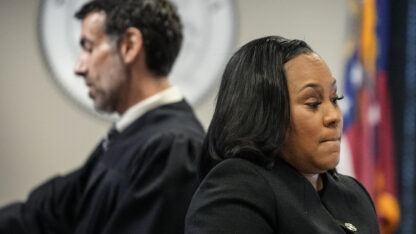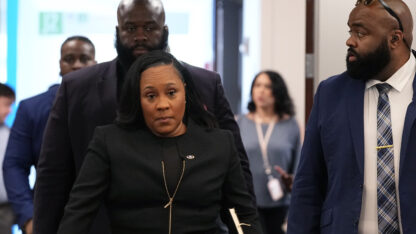Georgia features prominently in federal Trump indictment as charges near in Fulton
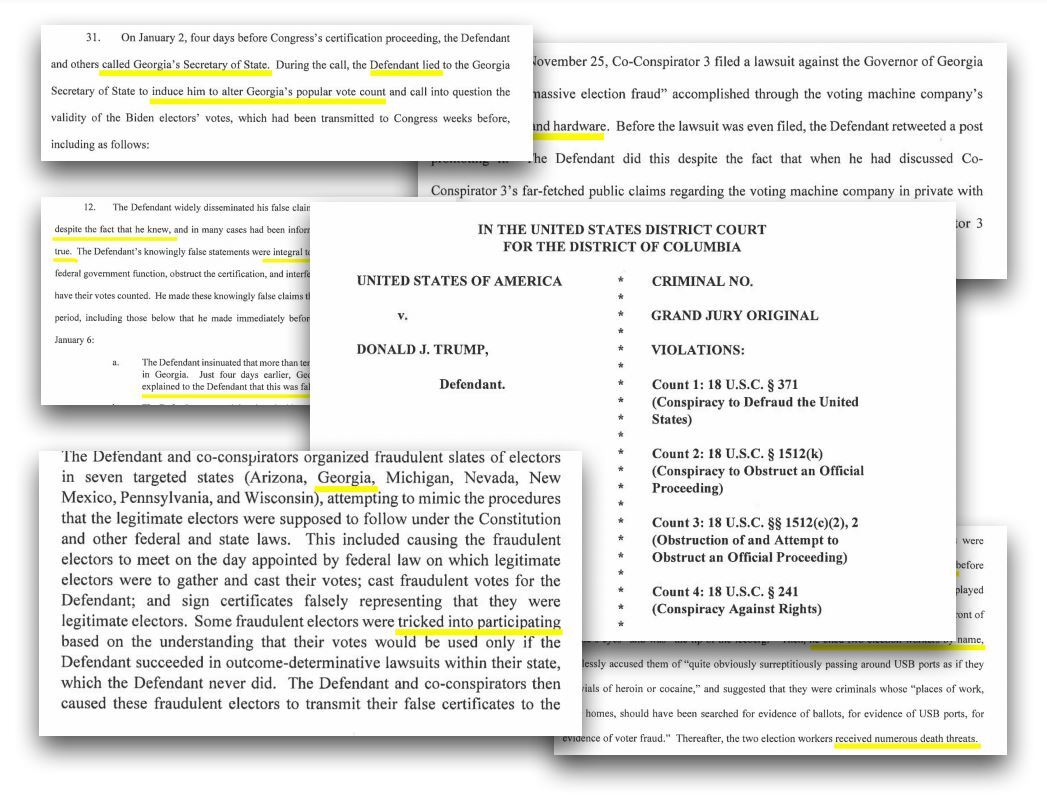
Georgia is mentioned 48 times in the latest indictment against former President Donald Trump. These four new criminal charges stem from Special Counsel Jack Smith’s federal probe into efforts to subvert the 2020 election result, including in Georgia.
Over 45 pages, federal prosecutors make the case that Trump knew his election fraud claims were false, but amplified them anyway as he tried to convince state officials to unlawfully help him stay in power.
Read on to see annotated sections of the indictment focused on Georgia.
This fresh indictment comes as Fulton County District Attorney Fani Willis is preparing to bring state charges sometime in the next few weeks following her office’s multi-year investigation into attempts to overturn Georgia’s 2020 election.
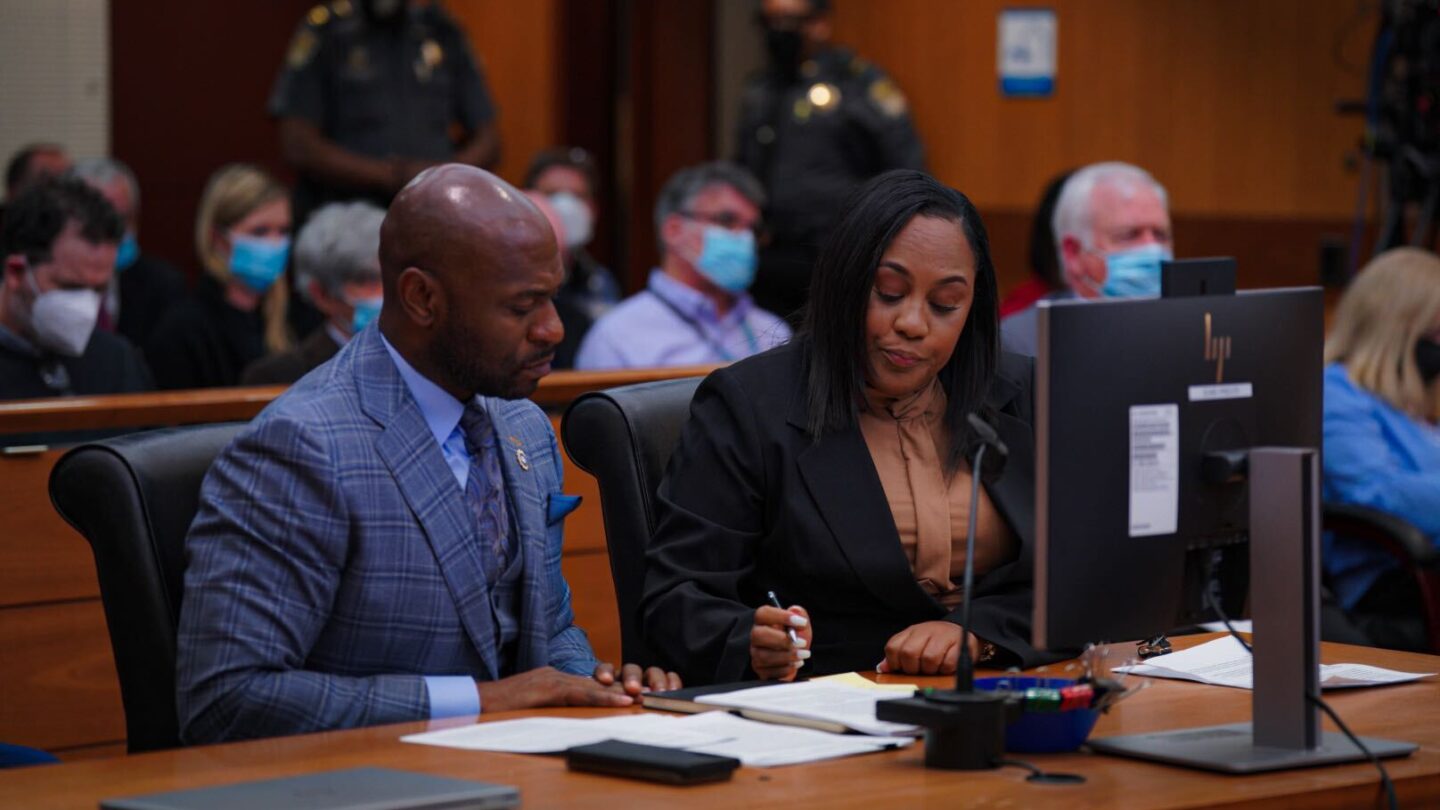
Subpoenas delivered as security ramps up
This week, Fulton County prosecutors sent subpoenas for witnesses to testify in front of a grand jury that has been hearing cases since mid-July.
WABE has confirmed that former Democratic state Sen. Jen Jordan and former state Rep. Bee Nguyen received subpoenas, instructing them to be on call to testify with 48 hours’ notice beginning Aug. 7.
Jordan and Nguyen attended state legislative hearings organized by Trump’s former personal lawyer Rudy Giuliani in December 2020, during which he spread false claims about election fraud and encouraged state lawmakers to take action.
Jordan and Nguyen testified last year in front of the special grand jury investigating Trump’s and his allies’ post-election efforts. Prosecutors can call witnesses to speak with grand jurors as they weigh potential indictments.
Journalist George Chidi, who witnessed a state Capitol meeting of Georgia’s fraudulent electors in the weeks after the election, tweeted that he also received a subpoena, as first reported by the Atlanta Journal-Constitution.
On Tuesday, Fulton County Sheriff Patrick Labat told reporters that if indictments from the 2020 election interference case were issued today, law enforcement would be ready.
Orange security barriers went up around the Fulton County Courthouse last week and Labat says his office is coordinating with multiple state and federal agencies.
“We’re creating a force multiplier that you’ve never seen before,” Labat said.
Labat said law enforcement has followed up on at least a dozen threats directed at him, the district attorney and judges, and one arrest was made in recent months.
He also said deputies have observed Trump’s earlier indictments in New York and Miami and will go to Washington, D.C., when Trump is arraigned there.
Labat also told reporters that any high-profile defendants indicted in Fulton County will be booked like everyone else.
“Doesn’t matter your status, we have mugshots ready for you,” he said.
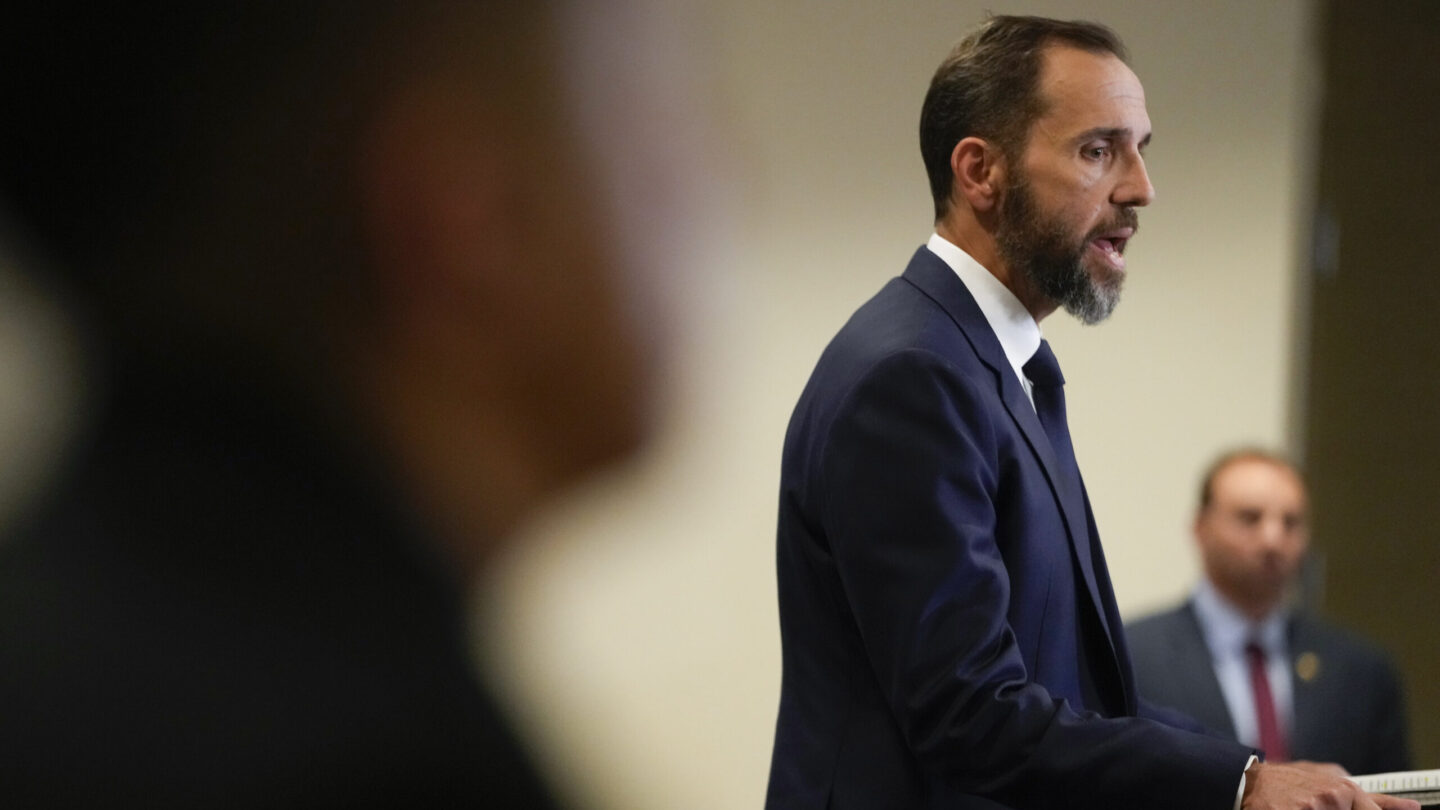
Federal indictment, annotated
Georgia appears first on page five of the federal indictment.
Like the Fulton County probe, federal investigators examined plans to organize fraudulent slates of electors for Trump.
In Georgia,16 Republicans signed onto a document submitted to the National Archives, despite Biden’s victory in Georgia.
The federal indictment says some of these volunteers were “tricked into participating” based on the belief that their votes would only be used if Trump won his election lawsuits in court, which he did not.
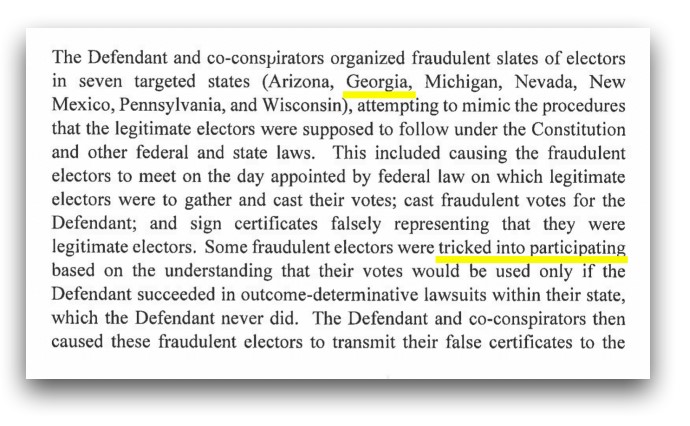
Last summer, Congressional investigators first outlined how the Trump campaign hoped to use these slates of electors to pave the way for Vice President Mike Pence to overturn the election on Jan. 6.
Federal prosecutors have not indicted any fraudulent electors. Willis, on the other hand, initially told all 16 from Georgia that they were targets of her investigation. At least eight have accepted immunity deals.
Unlike the federal charges so far, Fulton County prosecutors are expected to charge multiple people, possibly in a sprawling racketeering case. The federal indictment lists six unindicted co-conspirators, who are likely some of the same lawyers and Trump allies in the crosshairs of the Fulton County investigation.
Willis does not appear to be coordinating with federal investigators, despite the overlapping set of potential defendants, witnesses and activities.
“I don’t know what Jack Smith is doing and Jack Smith doesn’t know what I’m doing,” Willis told WABE in a Saturday interview, before the federal charges were revealed. “In all honesty, if Jack Smith was standing next to me, I’m not sure I would know who he was. My guess is he probably can’t pronounce my name correctly.”
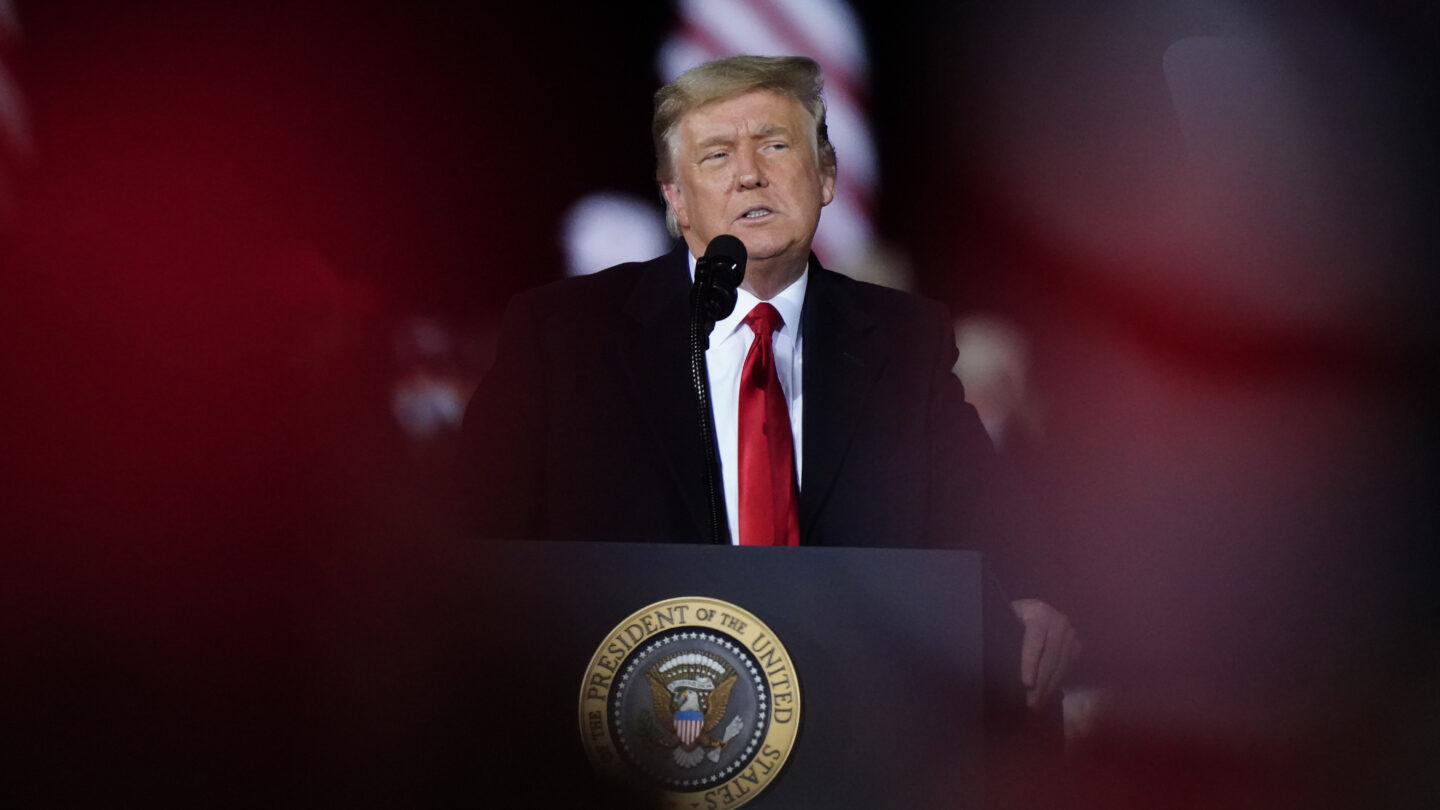
Knowingly false claims
The federal indictment acknowledges that Trump, like every American, has the right to make claims about election fraud, even if they were false.
However, the indictment seeks to outline how Trump knew those claims were false and purposely deployed them to pursue “unlawful means of discounting legitimate votes and subverting the election results.”
The indictment cites several examples of Trump knowingly making false claims, including right before the Jan. 6 attack on the U.S. Capitol. The first on that list is a Georgia example.
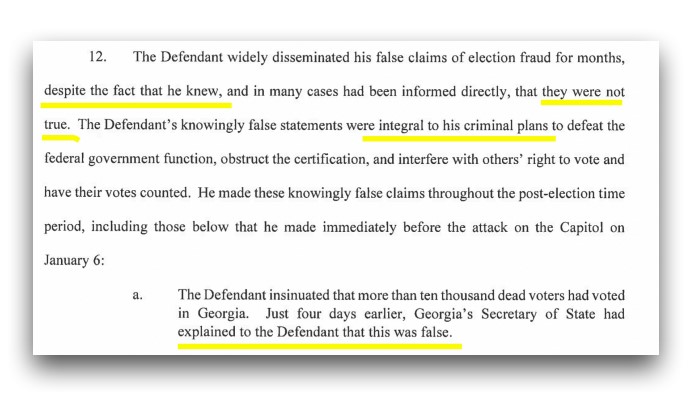
One by one, the indictment unspools Trump’s efforts to interfere with the election result in several swing states. Five pages are devoted to Georgia.
Voting machine claims
First, prosecutors detail how shortly after the 2020 election, Trump and his lawyers filed a lawsuit against Gov. Brian Kemp alleging that “massive election fraud” had been committed through the software and hardware of voting machines used in the state.
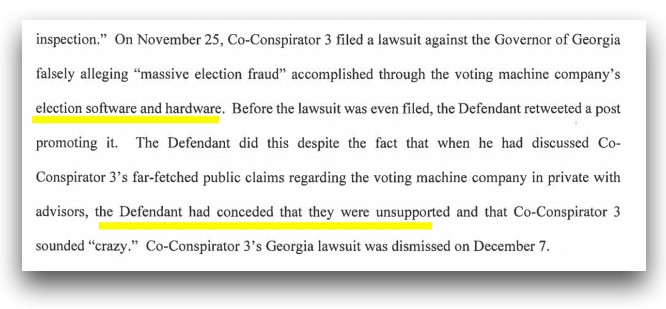
The indictment says Trump had privately conceded that the claims were “unsupported” and that the campaign lawyer promoting them sounded “crazy.”
State legislative hearings
Multiple paragraphs are devoted to two Georgia legislative hearings organized by former Trump lawyer Rudy Giuliani.
Prosecutors say “co-conspirator 1,” likely Giuliani, made knowingly false claims about fraud supposedly committed by two Fulton County election workers, with the intent of misleading lawmakers to block Georgia’s legitimate electors.
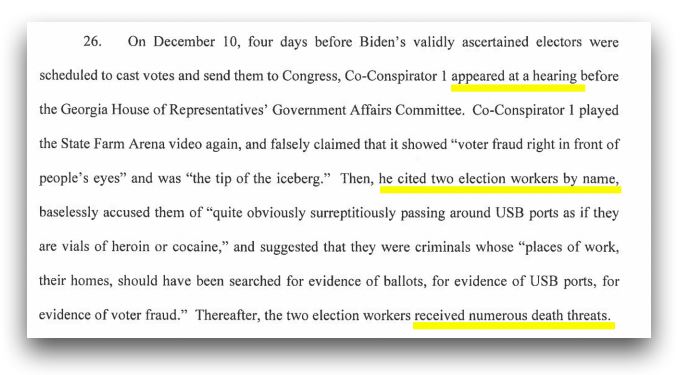
At the two hearings, Giuliani presented a video purportedly showing mother-daughter election workers Ruby Freeman and Shaye Moss pulling a suitcase of illegal ballots from under a table. That claim had already been repeatedly debunked, but the women continued to receive death threats.
The indictment accuses Trump of amplifying these “knowingly false claims,” tweeting, “Ballot stuffing by Dems when Republicans were forced to leave the large counting room. Plenty more coming, but this alone leads to an easy win in the State!”
Giuliani has been told he was a target of the Fulton probe. In a separate defamation suit, he recently said he would no longer contest that the claims about the Fulton election workers were false.
The phone call
And of course, the indictment details Trump’s infamous phone call to Georgia Secretary of State Brad Raffensperger.
Prosecutors say Trump “lied” to Raffensperger “to induce him to alter Georgia’s popular vote count.”
The indictment details how Trump said he needed to “find” 11,780 votes and implied that Raffensperger could be prosecuted “if they failed to find election fraud as he demanded.”
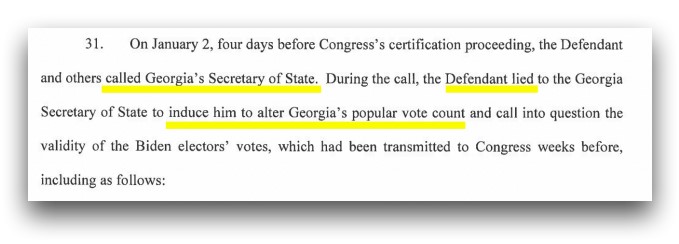
This call, which was recorded and leaked to the press, helped spur Willis’ investigation in Fulton County and will likely be a centerpiece of any charges brought against Trump in Georgia.
Tuesday night, Trump wrote on Truth Social that the charges are the result of a political “witch hunt,” comparing the criminal case against him to “Nazi Germany” in the 1930s.
In Georgia, the state GOP launched a website this week to counter the election investigations, with the intent of “debunking lies about the sixteen patriotic men and women” who served as fraudulent electors.
Kemp, Raffensperger, and Attorney General Chris Carr, who is also mentioned in the federal indictment as having told Trump his election fraud claims were unfounded, have not commented on the latest charges.
